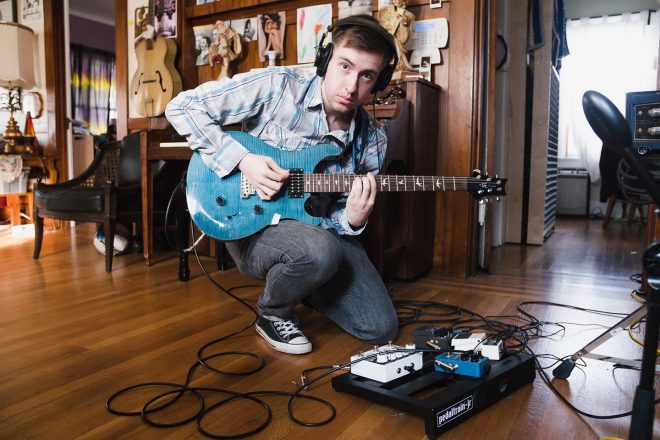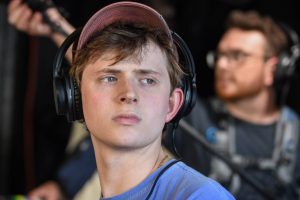Q&A: Joseph Hitchcock pins his heart on his sleeve on new Paper Anthem album

photo by Jason Alderman
For six years, Joseph Hitchcock has been recording and releasing pensive indie pop in the vein of Snow Patrol and The Postal Service under the moniker Paper Anthem. His third album, The Year You’ll Never Get Back, is the Eureka Spring native’s most exploratory project yet. Recorded over various studio sessions in Oakland and Los Angeles with the producers Christopher Reece Daddio and Fraser McCulloch, the album traverses synthpop and garage rock, often mixing the two. Though the title may bring to mind 2020—the year we all lost because of the pandemic—each of the songs are grounded in specific experiences in Hitchcock’s life, some dating as far back as 2012. In this track-by-track rundown, Hitchcock breaks down the album as if performing open-heart surgery, digging deep into past strife to find clarity.

Where does the album title, The Year You’ll Never Get Back, come from?
I feel like a lot of musicians get these ideas of grandeur, like, “Oh, I’m just gonna release this [project], and then I’m gonna get really popular.” And I had those sort of notions [about my first album, By Ghosts,] as well, so when that didn’t happen, I was really disappointed. [The year after, in 2016] I was trying to figure things out again. I had to move back to my hometown, Eureka Springs, which doesn’t have a lot of job opportunities. So I was driving over to this town called Berryville and working at a Walmart there, and that was the worst period of my life, I think. Nothing really terrible happened to me. A lot of people have much, much worse lives than me, but I felt very de-energized, like my soul had withered away. I didn’t really like how things were going, and for me, that’s what the title refers to. 2016 was the first time in my life where I felt that most of the year was a total waste, and I feel that people can resonate with that feeling because of the pandemic.
That year, I moved into this old office space on Dickson Street [in Fayetteville] for a month. Even though it was awful in some ways, it was one of the most creative points in my life because I only had an air mattress, a computer with no internet, and all my musical instruments. So every time I looked around, there was a guitar or a piano and I was forced to make music. That’s how the song “Receipt” came about.
In the first track, “Sign Language,” I was struck by the lyric, “It’s a pyramid scheme, this love.” It made me think about how we involuntarily and voluntarily put ourselves under the illusion that a relationship is perfect, only to find out that it isn’t at all. Could you unpack that, and talk about how the song as a whole came together?
I was thinking about this relationship that I had been in, which was the inspiration for my first album By Ghosts. This song is about thinking a relationship is just totally perfect, how you said. And then suddenly, it’s not. It’s about feeling that you were tricked, but not necessarily that they intended to trick you since we all try to present ourselves as best we can, which isn’t always truthful, even if we want it to be or if we feel like we are presenting the truth. “Sign Language” is also about the disappointment that you can’t be with this person anymore, even though you love them. The lyrics present the situation in a more abstract or visual way because saying things literally can be uncomfortable and not as interesting to me.
I was also thinking about how you can just tell that a partner’s feelings toward you have changed, based on small details like little twitches in their hand when you hold it, or something altogether subconscious. As humans, we can just tell when something’s off. That line of thought was behind the title, “Sign Language.”
An artist friend of mine from Bulgaria created a beautiful animated music video for “Sign Language,” where she represents a personal experience concerning a relationship that was totally destructive to her. There are a lot of connections between the video and the song … Also, [producer] Chris Daddio’s girlfriend performed the string arrangement, which blew me away. If we were to rate songs like restaurants online, her strings made the song go from one dollar sign to two or three.
The second track, “Receipt,” opens with the image of a wet receipt balled up in your jeans, perhaps after being forgotten in the wash. When I first listened to the song, it made me think about wishing you could wipe the slate clean with someone. You know, “return” the experience, get a receipt, and be done with the situation. Does that resonate with your songwriting?
Wet receipts happen to me all the time. I just forget to dig out the pockets of my pants before I throw them in the wash. I actually really love your interpretation. I like it better than the experience that caused me to write the song, which isn’t fun to think about.
I was in a very brief relationship when I was living in the air mattress room [in Fayetteville]. It was with someone who didn’t talk a lot about feelings or intentions before acting. She would immediately go for a kiss, and next thing I know, I’m in a relationship now without ever having had a clear conversation about it. The song is about not knowing how to put the brakes on without hurting anybody. And then, of course, there’s the inevitable overthinking and wondering if I reject this person, maybe no one will ever like me ever again. So that receipt metaphor makes sense here; the song’s about wishing there was a way I could just take the situation “back to the store” without hurting anyone’s feelings.
You wrote “Receipt” while you were still learning to play electric guitar. Do you think that there’s something to be gained from not knowing the rulebook cover to cover, especially when it comes to being more creative and off-the-wall with your songwriting?
Yes, absolutely. I like not knowing what I’m doing at the beginning. I actually haven’t had any substantial guitar lessons. I tried a couple, but they were making me like guitar less because my teacher was very classic rock-influenced … It was more enjoyable and unrestricted figuring out guitar on my own.
Next up is “Within Walls.” The music video stars a bloodthirsty vampire. Could you break down the subject matter of this song?
This song is about a time when I was led on by a girl because she was actually interested in my friend. It explores what it feels like to be left out or to be the odd one out. I was also trying to write it not just from my perspective, but also from my friend’s perspective because I still cared about him. A lot of the misery of the situation came from the fact that this experience ruined my friendship with him. I trusted him so much, and he was the best friend I’d ever had at that point, so I felt really betrayed. So that’s where the end lyric, “This is what we know / Of how you hurt us so,” comes from …It’s both our perspectives.
This next song, “Mistakes,” as well as others on the album make use of synths a lot more than in your previous music. What inspired your decision to explore electronic music?
Ghost Stories by Coldplay really impacted me. It’s sad pop music, but it has such a nighttime feel to it. I also like that it’s still a band playing, but half the instruments are electronic … . [My producer] Fraser [McCulloch] was a big help to me [in exploring synths]. I would play a part on a MIDI or a regular keyboard connected through a MIDI, and he would go through 100 different sounds…until we found the right sound. The synth on “Mistakes” I actually sourced online for free …This was one of the first songs I ever wrote. I think it was 2012. I wrote it on piano originally, but it was so monotonous. It was meant to be a synthpop song. So I basically just waited five years or so until I knew how to make an electronic song.
On “Coal,” there’s this contrast between the self-deprecatory lyrics and the carefree doo-wop-style rhythm and major key. The lyrics are in second person, but later in the song you reveal that you’re talking to yourself in the mirror. What was writing that song like, and why did you set up that contrast between the music and the lyrics?
I wrote this song in late 2015. I think of this song as a sequel to “Within Walls” because it’s about what happened after that experience. I was dealing with feelings of rejection and feeling like I wasn’t good enough for anybody. And I thought it’d be interesting to put it into a song, since I know other people go through this too … There’s this scene in Bojack Horseman where the main character is talking to himself in a mirror in a nasty self-put-down kind of way. It hurt to watch that, and it made me realize that’s how I talk to myself when I don’t like myself. I wanted to capture that in a song.
Sometimes I would get so depressed it would almost be hilarious, like, how can someone be this sad? That’s where the contrast between the music and lyrics comes in. The song is in a major key. I didn’t consciously decide to make it sound happy, but it definitely came about, especially when we added the synth flourishes. It’s funny, but also serious. I like the complication.
“Shatter” is a turning point in the album. The songs start getting more guitar-prominent, even veering into garage rock territory. How did this song come about?
Whenever I write a song, I hear the melody first in my head. I hum it out loud, and I can already tell what instrument I’m going to use….With “Shatter,” I was playing around with these guitar plucks with reverb….It came together in an hour or two. The instruments came first, then the main melody and lyrics, which is how I used to write songs. Now I mostly write in my head. I hear a melody and make it happen. But with this song, I played around and found chords I liked….It’s a song about trying to understand yourself and your place in the world.
“Sunday” ends with a distorted guitar breakdown. Tell me about the process of building up to that point.
The song started as an acoustic guitar riff I came up with in 2012….For five years, that’s all that song was. Later, around the time I was working at Walmart, I got the idea to make it heavier….I let it sit for another long time. In 2017, I was in the studio. I thought it was going to be an instrumental….At the last minute, I thought it would be a mistake to not have any lyrics. It was coming together in such an interesting way….Right before that, my car had been broken into in Oakland, and I had a bunch of equipment stolen. Thankfully, it wasn’t music equipment. It was all film equipment, so it still sucked, but I was able to finish the song.
On “Patience,” you actually sing about love and relationships in a semi-positive light.
Well, in the moment the song is capturing, yes. The next three songs, including “Patience,” are a kind of trilogy about the same relationship. “Patience” is about someone who I was really into, and they were either not interested but didn’t have the courage to tell me they weren’t interested and told me that they just weren’t ready for something like that. Or they actually weren’t ready for something serious, but did like me. I still don’t really know which, but I told them I was going to wait for them, and they seemed responsive to that. This is a song about waiting for someone to be ready to be with you.
Later on, I was living in Seattle, and I connected with this singer-songwriter named Keegan Leonberg. I found him on Bandcamp, and I just thought his music was so beautiful. I asked him if he’d add instrumentation to “Patience” and “Dreamweaver.” [On “Patience,”] he added the synthesizer that comes in at the very beginning, before the acoustic guitar. It’s atmosphere and transportive. He also added the bells. I can’t imagine the song without those additions.
What is it like, taking yourself back to past experiences to write songs? Is it ever hard?
I definitely have to push myself to feel that way again, but only a little bit because I remember things so vividly, as if I were still in that moment or as if they just happened. That’s something I’ll have to navigate again with some songs I wrote in Bulgaria two years ago. I’m hoping to record those songs next.
There’s something so exhilarating but also terrifying about falling in love. Why did you want to capture it in song form with “Daywalker”?
It just makes me feel alive. I feel like [love is] the only thing worth living for, even though I don’t feel that feeling very often. But when it does happen, it’s just so nice. It just feels like everything else was worth it just to feel this way. And it’s obviously temporary. Even when a relationship goes well, that feeling will just go away anyway. It’s like being on drugs or something like that but better.
It’s scary too. The lyric, “Oh, how I plan to ignite the forestry that I’ve grown, now that you’ve come to stay,” has to do with that. I was talking about how if this person wanted me to, I would just give up music forever … and I guess that is awful and scary, but that’s just how powerful it felt to me at that time. I wanted to represent that extreme with the image of burning down a forest.
How does “Dreamweaver” fit into the three-part song series about the relationship?
This song is about the last time I saw her, and we had just watched a movie. Even though she told me that it was time for me to leave, she fell asleep on me. By that time, I was drifting off too. And later she woke up and I left. But that moment where she was sleeping on me felt so peaceful. I wrote this song imagining our two minds being connected through some psychic dreamworld where we could be together. I was imagining us in a boat, maybe floating through the River Styx with evil spirits trying to get us from the water. I was trying to tap into that peacefulness amid a sea of terror.
The last song is titled “Clarity.” Why did you call it that?
This album is a collection of songs about stupid, sometimes traumatic experiences. I feel like after all of them, I come out of it with a little more clarity. Having a song to represent that and the idea of moving forward was important to have at the end of the album.





Comments